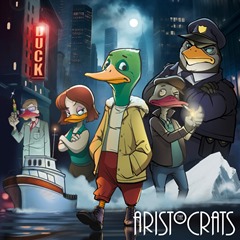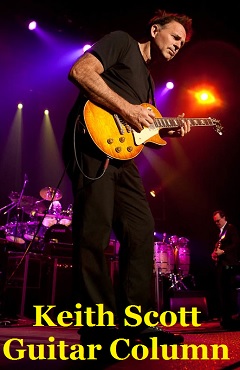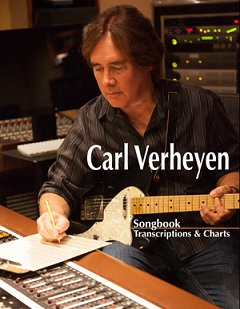Guthrie Govan

Photo by Jon Luini
Guthrie Govan (guitar), Bryan Beller (bass), and Marco Minnemann (drums) form the powerhouse trio known as THE ARISTOCRATS. Their latest concept album, “DUCK,” features a narrative centered around a duck protagonist. Interestingly, the story was not created first. Instead, each member composed three tracks independently, and these nine tracks were then woven into a cohesive nine-chapter tale.
With their deep knowledge of various music genres and exceptional technical skills, THE ARISTOCRATS create music that paints vivid, cinematic scenes. Their latest work stimulates the listener’s imagination and draws them deeply into the story. We had the opportunity to speak with Guthrie Govan about THE ARISTOCRATS’ new album “DUCK,” as well as his involvement in Hans Zimmer’s projects.
Interview / Text Mamoru Moriyama
Translation Hiroshi Takakura

Photo by Simona Wordeman
Muse On Muse : The Aristocrats’ latest album “DUCK” masterfully paints a story through music, engaging the listener’s imagination and drawing them into the narrative. Could you tell us about the concept behind this album?
Guthrie Govan : It’s essentially the story of Duck, a character who lives in the Antarctic region but is forced to flee to New York City after getting into trouble in his homeland and finding himself pursued by Sgt. Rockhopper, a scary penguin policeman. (Some of our fans might remember this same police penguin from the cover of our 2020 live album “Freeze”?) I don’t want to give away too many details about the plot because our plan is to release the full story gradually on our website, in 9 song-by-song instalments, and we’d like to keep our listeners guessing about what might happen in each subsequent chapter of the tale! Needless to say, it’s an exhilarating tale – Duck has all kinds of adventures and misadventures therein 😉
MM : The album cover featuring ducks adds an intriguing element to the work.
GG : We’ve always enjoyed the idea of our album covers featuring cartoon-flavoured graphic artwork… that way, it just feels more in keeping with the playful spirit of the band. For the majority of our previous album covers we worked with the fantastic Tom Colbie but when we reached out to him to see if he would be interested in creating some artwork for Duck we discovered that, tragically, he had passed away.
One of Bryan’s contacts then put us in touch with Lance Myers, who has provided animated work for all kinds of interesting computer games, TV stations and so forth… (Check out some of his other works online – I promise you’ll be both impressed and amused!) Lance’s style is recognisably very different from Tom’s and yet, somehow, we felt that he managed to capture the full Aristocratic spirit, from a different perspective.
MM : DUCK” consists of nine chapters, with each member composing three chapters (songs). How did you decide who would handle which chapter (song)?
GG : Well… the songs basically came first and then the story emerged once we had collated all the material and realised the potential for a conceptual narrative. When each of us composed our traditional 3-song submission for the new album, we really had no idea what our band mates would come up with – we were all writing material concurrently. As you can imagine, we were pleasantly surprised when we put everything together and realised that we actually had enough ingredients to build a fully coherent narrative in which the music really would reflect the mood for every twist and turn in the plot so… I guess that’s when we just decided to “go all the way” and create our own subversive interpretation of the “concept album” tradition!
MM : In a previous interview with Muse on Muse, you mentioned that the demos during composition are quite refined, giving a clear idea of what each part should sound like. Were there any new approaches taken in composing the music for the different chapters of the “DUCK” story?
GG : Our process has pretty remained the same throughout the writing and preproduction phases of every Aristocrats album. Early on in the band’s history, we seem to have found a system which worked well and felt really natural to us so we’ve never made any conscious effort to rethink the basic methods of creating our music. (I live 8 time zones away from BB and MM so the option of meeting up regularly in a rehearsal room clearly really work for us!)
Having said that, there are certainly some aspects of Duck which are unique to that album… For instance, Slideshow marks the first time I’ve ever contributed a song where the arrangement requires a lot of overdubbing – throughout the history of this band, I’ve always tried to arrange my song ideas in the hope that we would be able to convey them effectively in a live “raw trio” context but Slideshow is unapologetically an “album track”.
With each new album, we try to find some fresh stylistic inspiration. When we were making Duck, it came as a relief for us to realise that we still haven’t run out of unexpected new genres to play around with… hopefully our fans will enjoy the fact that this new album dabbled in everything from ‘90s dance music to Balkan folk!
MM : Bryan Beller’s compositions “Aristoclub,” “Muddle Through,” and “This Is Not Scrotum” all feature clear, catchy melodies.
GG : They do indeed! I think Bryan’s songwriting for the Aristocrats generally feels more like Guitar Music than people might expect. I don’t know if this is in any way informed by all of his experiences playing guitar-centric music with Dweezil Zappa, Mike Keneally, Steve Vai, Joe Satriani etc but… for whatever reason, BB does seem to have an innate understanding of how the guitar can function as “the singer” in instrumental music.
MM : Marco Minnemann’s compositions “Hey, Where’s MY Drink Package?” “Sittin’ With A Duck On A Bay,” and “And Then There Were Just US/Duck’s End” illustrate the story through various rhythmic changes within the tracks.
GG : Marco’s tunes, even the simpler-sounding ones, always contain some little surprises which usually reveal themselves to me when the time comes for me actually to learn them. It’s not unusual for every verse of chorus in a Marco song to be subtly different from the one before – I think his goal when writing for this trio is to come up with things which feel melodic and have a groove but without ever being predictable.
In terms of Drink Package, specifically, Marco’s intention was to take a rhythmic concept which some people might find complex or intimidating (in this case, the superimposition of 5/16 and 4/4 time signatures) and demonstrate that it’s possible for such concepts to groove convincingly and actually feel good, rather than just coming across as technical demonstrations.
MM : In “Sittin’ With A Duck On A Bay,” your guitar work is notable for its clean, jazzy tone and the driven tone with wah-wah effects that evoke the presence of the Duck.
GG : Well… I think Marco wanted to write something which sounded “old school”, with a 1970s flavour. When I heard the demo, I wanted to find out what I could do to interpret/enhance his intentions for the song so I decided to use what I considered to be an authentic “70s guy” rig – a Gibson ES-335 running into a Fender Deluxe amp. Involving a wah-wah pedal just felt irresistible as soon as I learned that the song title included the word “duck”!
Out of all the material on the album, I think that song might be the one which most effectively highlights the “jamming/interacting” side of what we do as a band. There are still plenty of fully composed sections, of course, but the intro and the guitar solo section really are just the three of us having spontaneous fun in real time and just waiting for one of us to give the signal to launch into the next written section. Lots of fun!

Photo by Jon Luini
MM : Your compositions “Sgt. Rockhopper” and “Here Come The Builders” feature dynamic guitar playing that drives the songs, while “Slideshow” is remarkable for its clean guitar sounds.
GG : Sgt Rockhopper was my weird attempt to channel a slightly more “punk rock” kind of energy than you might normally expect to find in one of my songs. All I can really tell you about that one is that I wrote it to accompany the mental image of a penguin in police uniform, patrolling across the Antarctic on a snow mobile. I don’t know why I wanted to write a song about that… I just did 😉
When I think of all the songs I’ve ever contributed to the Aristocrats’ catalogue, Slideshow somehow feels like the odd one out. Normally I really do my best to write specifically for the trio but I remember a period where the deadline was looming, I still needed to write one more song for the album and… various Slideshow ideas just started to fill up my brain. I really didn’t think the vibe of the song would be suitable for the Aristocrats but some of the melodic/harmonic motifs (and indeed that short, repetitive polyphonic tapping loop) just wouldn’t get out of my head so I eventually came to accept that I needed to finish the song, without worrying about its final destination. Fortunately, I ended up feeling uncharacteristically pleased about the finished song and my bandmates seemed to like it too 😉 I suppose sometimes it’s good to listen to one’s instincts rather than fighting them… to create whatever you’re feeling in the moment, rather than worrying too much about what you’re supposed to be creating?
MM : The transition in “Here Come The Builders” from Edvard Grieg’s “Morning Mood (Peer Gynt Suite No.1, Op.46)” to a driven, bouncing guitar riff is very cool.
GG : When I started working on that song, I was actually trying to come up with some kind of jazz-fusion ballad with lots of pretty chords but… an unusual amount of construction work was going on throughout the apartment block where I was living at the time so my thought processes were constantly being interrupted by the sounds of hammering, drilling and such like. I tried to resist this for a while and to persevere with my initial plan for the song but in the end I just decided to accept the noisy, arhythmic chaos all around me and to incorporate that atmosphere into the track I was writing. Starting out with an excerpt from that famously tranquil Grieg piece just felt like a suitably funny way to exaggerate the shock factor of those builders suddenly showing up and interrupting my half-finished ballad with their shameless cacophony! I guess the builders probably deserve a co-writing credit on that one, purely for the inspiration 😉
MM : Across the compositions by yourself, Marco, and Bryan, you utilize every possible guitar sound, tone, and technique to vividly craft scenes that stimulate the listener’s imagination.
GG : All three of us agree that the sonic texture of a piece of music can be just as important as the notes/chords/rhythms. Without the right timbre, sometimes all you really have left is just a bunch of notes and… you can’t really expect to take the listener on a meaningful emotional journey unless the sound is right, too.
We like to dabble in a wide variety of genres and we’ve always made an effort to find the most appropriate tones for each track… I guess this helps the overall flow of the album and keeps things interesting for the listener. The stylistic variety kind of encourages us to keep looking for new sounds… which is fun 😉
MM : Can you tell us about the guitars, amps, and pedals you used on this album?
GG : This is a twofold question, as I recorded my parts for the album in two very different environments.
When we were all together in the studio in Ojai CA, I was using a couple of my signature Charvels for the most part, running through my trusty Victory V30 head and into a 2×12 cabinet with Celestion Vintage 30s. Effects-wise, I remember using an Xotic wah on Sittin’ With a Duck… and some kind of Klon replica on parts of Builders, (I don’t actually know the name of the company who made that “Klone” – it was just something which we found lying around in the studio!)
When we ran out of studio time and had to go back to our respective homes to finish up the individual tracking/overdubbing, I found myself back in my apartment (fortunately without the builders’ accompaniment!) so I was using various instruments from my guitar collection, all running into a Fractal FM-9. You’ll hear a Reverend Airwave 12-string on This Is Not Scrotum, for instance, whilst the more overdriven solo in Muddle Through was played on a Nik Huber Orca 59. Oh, and I lost count of how many different guitars I used on Slideshow 😉
MM : In expressing scenes of a story through music as you have done in this work, you’ve also been involved with projects by the film composer Hans Zimmer. Could you tell us about how you became involved in working with Zimmer?
GG : Ten years ago, I received a Facebook message from someone who claimed to be Hans Zimmer, asking if I would like to join his band. At first I was very reluctant to believe that the real Hans would even have heard of me – I had seen plenty of weird communications from imposters in the past! – but he finally managed to convince me that he was indeed the noted Hollywood composer… and that he had stumbled upon some YouTube footage of me playing fretless guitar, which he found intriguing. At that point, obviously, saying “yes” was the only response from me which would have made any sense at all 😉
Initially my role in Hans’ musical operation was simply to invent some guitar parts for the “greatest hits” pieces featured in his live set (there really isn’t much guitar at all on the well-known original recordings of that material!) but my involvement has since expanded somewhat and I’ve now played on a few of his scores, most recently Dune 2. I really like the process of trying to contribute something meaningful within that field of music, and I’ve definitely learned a lot from working both with Hans and with orchestral players.
MM : Could you discuss the differences in the musical demands and guitar play between your solo work and The Aristocrats, and your projects with Hans Zimmer?
GG : Those are two completely different worlds. The Aristocrats trio is our “baby” – we write all the music, we make all the business decisions and each of us can constantly remain aware of exactly what the other two are doing onstage (one of the advantages of a small lineup like our trio!) so there’s more freedom to improvise and stretch things out on stage. In Hans’ band, each musician gets some opportunities to “shine” but essentially the purpose of us all being gathered together is for us to do justice to HZ’s compositions as best we can, as opposed to presenting our own music. We all need to remain aware that we’re components in a much larger and more complex machine so there’s a lot more structure in that environment… there needs to be, otherwise the whole thing would fall apart!
I can honestly say that I really enjoy both musical settings – in each case, I get the opportunity to play with amazing musicians but with a very different mindset. Switching between these two modes always feels like a creative “refresh”…
MM : In the “Top Gun: Maverick” soundtrack, Hans Zimmer is credited along with others, and you are listed as a score consultant. Could you elaborate on your role in this soundtrack? Did you play guitar on it?
GG : No, I didn’t actually play anything on that score. Occasionally, people will reach out purely because they’re interested in hearing some additional opinions, ideas, feedback…
MM : What are your upcoming plans?
GG : I have a lot of touring coming up, both with the Aristocrats and with Hans Zimmer! (Next stop: Dubai with Hans and his band…) Apart from that… who knows?!
MM : Could you share a message for your fans?
GG : Thank you all so much for listening – the Aristocrats play some pretty weird music and we’re well aware that what we do won’t appeal to everyone’s tastes so… we truly appreciate your support. Hope you enjoy Duck and we look forward to seeing you somewhere out there on the road!
The Aristocrats official website https://the-aristocrats-band.com/

THE ARISTOCRATS / DUCK
1. Hey, Where’s MY Drink Package?
2. Aristoclub
3. Sgt. Rockhopper
4. Sittin’ With A Duck On A Bay
5. Here Come The Builders
6. Muddle Through
7. Slideshow
8. And Then There Were Just Us / Duck’s End
9. This Is Not Scrotum

